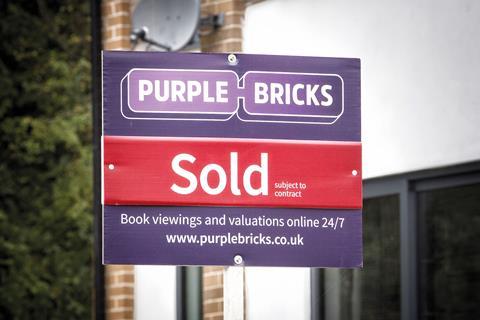I wandered lonely as a geek on a virtual research tour through Putney recently, rather appropriately using Google Street View.

Upper Richmond Road reputedly contains the longest unbroken line of estate agents in the UK. I counted eight on one side of the road, faced by four on the other side. If the primetime TV ads from virtual estate agent Purplebricks are to be believed, their days may be numbered.
‘Disruption’ is predicted by many to migrate from the retail world to estate agency. There is no doubt Amazon has transformed the retail world, leading to a litany of failures among famous high-street names, most recently House of Fraser.
It’s questionable whether there will be the same impact on what are effectively shops selling the biggest-ticket item of most people’s lives.
However, in the past few months there has been a flurry of corporate activity in the online property space – both online agents and the property portals that service the more traditional variety – suggesting there is a revolution at hand.
In March, German digital media group Axel Springer paid £125m to secure an 11% stake in Purplebricks, which operates a ‘hybrid’ model, comprising its online platform and a network of ‘local property experts’, allowing it, the company claims, to charge vendors less than ‘traditional’ agents. According to Purplebricks, the new funds will accelerate the rollout of its platform to the US and support and fund technological innovations.

With a stock market valuation of around £1bn, Purplebricks is the biggest online agent. But the would-be disruptor is facing potential disruption. At the end of May, smaller rivals Emoov and Tepilo joined forces with online letting agent Urban in a £100m merger, in which, intriguingly, Channel 4 will take an undisclosed stake in return for airtime on its channels. (Tepilo founder Sarah Beeny presents Channel 4’s Property Ladder and Help! My House is Falling Down.)
Purplebricks may now face stiffer competition from this much-enlarged number two at a point when UK property transactions appear to be slowing – a factor that may have contributed to it guiding down expectations of this year’s revenue by some 5% at the time of the Axel Springer deal.
Online agents account for around 7% of new property listings; how much further they will eat into traditional agents’ market share remains to be seen.
Agents I’ve talked to concede that there is a place for virtual competition. But it is likely to be at the lower-priced, ‘commodity’ end of the market. Slower transactions could test the model: traditional agents earn their spurs (and their commissions) unblocking chains in a sticky market.
Outbreak of disruption
Sellers may be tempted by the low fees, but I’m told there’s a steady trickle of miffed homeowners reverting to the more traditional route if they don’t sell. One’s home is the biggest-ticket item most people buy or sell in their lifetime. I, for one, would prefer to have an office to march down to in order to do a bit of ****-kicking rather than exchanging threats on online ‘chat’ or the end of a mobile phone.

There’s also been an outbreak of disruption among the property advertising websites that serve the high-street firms. The sector is dominated by Rightmove, which is paid fees by agents operating from more than 17,000 offices to advertise their properties.
Number two ZPG, which owns the Zoopla website, has received an agreed £2.2bn bid from Silver Lake Management Company. ZPG has a broader range of consumer services, including uSwitch and Money, which may have attracted the US technology investment group.
Find out more - Silver Lake/Zoopla deal will have far-reaching implications for UK property and proptech
An issue with many agents is the high fees being charged by Rightmove in particular – more than £1,500 per office per month for smaller companies that do not qualify for multi-branch discounts. This has spurred the creation and February flotation of OnTheMarket (a client of mine), in which 70% of shares are owned by agents and which offers far lower rates.
It has added some 3,000 branches since February, taking the total to more than 8,500, with the additions mainly offering discounts or being free for a trial period. It is reasonable to expect a period of ‘game theory’ among the rivals and agents themselves in terms of who joins which platform.
But, with an increasing focus on proptech in what had been a highly traditional market, it’s safe to assume there are further developments to come.
Regardless, to paraphrase Mark Twain, “reports of the death [of the local estate agent] may be exaggerated”.




























No comments yet